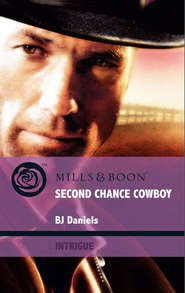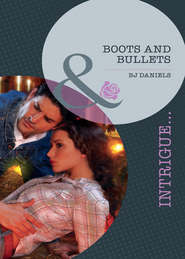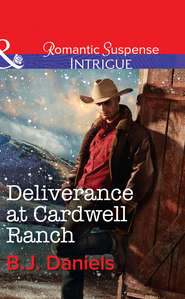По всем вопросам обращайтесь на: info@litportal.ru
(©) 2003-2025.
✖
Forsaken
Настройки чтения
Размер шрифта
Высота строк
Поля
Dewey looked up. A lock of his dark hair had fallen over one bloodshot brown eye. She felt her stomach roil.
“Come on,” she said, gentling her voice the way she would have for a spooked horse. She dropped the pitchfork over the partial wall into the next stall and held out her hand.
But before Dewey could take it, the deputy stepped between them.
“I’m going to have to handle this,” he said to her then turned to Dewey. “What’s your name?”
“His name is Dewey Putman. He’s my sheep tender.” Then turning to Dewey, she said, “What I need to know is what you’re doing here, and where are Branch and my sheep?”
The deputy shot her a look that said he’d prefer to do this his way.
Before she could remind him that he was on her ranch or that she had two thousand sheep and possibly no herder, he said, “Could you please make some tea?”
Bristling, Maddie raised a brow. “Tea?”
“Or coffee if you prefer. Something to warm him up. Also, he’ll need a change of clothing. His clothes are soaked. If he isn’t suffering from hypothermia, he will be.”
Ready to do what came naturally and take care of things herself, she had to bite her tongue as she shot another look at Dewey. He was trembling like a dog cornered by a grizzly and in as bad shape or worse than his horse.
Something had happened in the sheep camp back in the Beartooth Mountains. Even before she’d seen the blood on his clothing, she’d known by the look in the young man’s eyes that he was in trouble. The deputy knew it, too.
Dewey was her employee, her responsibility. While her first instinct was to help him, she knew from the warning look the deputy had given her that Dewey’s welfare was now out of her hands.
“I’ll see to his horse,” she said. “There’s a pot of coffee on the stove. Help yourself.”
CHAPTER TWO
DEPUTY SHERIFF BENTLEY JAMISON watched the ranch woman stride off, before turning back to the young man cowering in the corner of the stall. He’d seen his share of young men with blood on their hands. None, though, had looked as terrified as this one.
“Son, I’m going to have to ask you to stand up now,” he said.
As Dewey Putman stumbled to his feet, Jamison searched him for a weapon or any sign of an injury that could account for the blood on the boy’s clothing. The tender was little more than a kid, late teens at most. He had no weapon and had no visible wounds. So there was a good chance the blood on his clothing wasn’t his.
“Let’s go up to the house,” Jamison said. “I’m going to need to call your parents. Can you tell me that number?”
The boy shook his head.
He figured Mrs. Conner must have it as he led the young man through the dimly lit barn.
As they neared the open barn door, Dewey balked. He shook his head, hugging himself and moaning under his breath as he looked toward the bright daylight outside.
It was one of those beautiful early June days in southwest Montana. A blinding sun hung in a cloudless blue sky. The breeze smelled of spring, but its cold bite was a reminder that summer in these parts was weeks off.
“It’s all right,” he told the boy. “It’s not that far to the house. I won’t let anything happen to you.” Still, he had to take Dewey’s trembling arm to get him to cross the patch of sunlit earth to the house. What, he wondered as an icy chill settled over him, had frightened this kid so badly?
At his patrol SUV, he took out the investigation kit he’d been given when he’d started as deputy. So far, he’d had no use for it. Crime in this part of the world was barking dogs, an occasional barroom brawl and traffic control when a semi blew over on the pass. It was a far cry from his job as a homicide detective in New York City.
On the porch, he had the boy strip off his wet, soiled clothing down to his underwear. He led him into the house and was looking for the bathroom when he heard Madison Conner come up the porch steps.
“Don’t touch those,” he said through the screen door as she knelt to pick up the boy’s dirty clothing.
She rose with an indignant sigh, took one glance at her half-naked tender then pulled open the screen door and walked past them. “The bathroom is the second door on the left,” she said, pointing down a short hallway without turning to look at them.
“I need to contact this boy’s parents or guardian,” he said to her retreating back.
“You’re looking at his guardian,” she said before disappearing into the kitchen.
In the green-and-white-tiled 1950s-style bathroom, Jamison turned on the shower and quickly ran the necessary forensics tests, scraping under the boy’s fingernails and swabbing his hands and wrists for gunshot residue, before he let him climb into the hot shower.
He left Dewey long enough to bag the boy’s clothing and load it and the specimens he’d taken into the patrol SUV before he returned to the house.
When he walked in, he found Madison Conner putting clothing outside the bathroom door. She gave him a look that made it clear she didn’t like him interfering with what she considered her business.
Since arriving in the state a few weeks ago, Jamison had learned how independent Montanans were—especially ranch women. Behind the often weathered suntanned skin he’d glimpsed an iron-strong will. He’d never seen more capable women.
Whether hauling trucks loaded with ranch supplies, feeding dozens of ranchers at brandings or jumping in to help with every chore on the spread, there was little these women didn’t know how to do—and well.
This was the first ranch woman, though, that he was about to butt heads with.
He took note of Maddie Conner’s clothing from her loose-fitting large flannel shirt and jeans. Her boots were as worn as her hands, and both were a sign of a hardworking rancher. There were fine lines around her cornflower-blue eyes. The set of her jaw bespoke of a stubbornness born of living in a man’s world. But while she might hide her femininity under a lot of attitude and loose clothing, there was kindness in her face that the years and her lifestyle hadn’t yet eroded.
As she straightened the stack of clothing she’d left for the boy he glimpsed a deep sadness in her expression, which she quickly masked. She made a swipe at an errant lock of her hair. It was long, the dark red of cherrywood with a few streaks of silver woven through. It surprised him to realize she was probably close to his own age.
As if sensing him watching her, she checked her expression and gathered up her thick mane. With nimble fingers she trapped it again in the large clip that held her hair off her neck. He couldn’t help noticing how pale and soft the exposed skin appeared.
“Yes?” she asked, irritation in her tone as her gaze met his.
“I need to ask you a few questions,” he said, embarrassed that she’d caught him staring at her. “You’re Dewey’s legal guardian?”
She gave him a grave nod. “Come into the kitchen,” she said, turning her back on him. She appeared reconciled to the questions and his being there, but definitely not happy about it. “The sooner you get your answers, the sooner I can see to my shepherd and flock.”
Jamison followed her into a sunlit yellow kitchen that looked as if it, like the bathroom, hadn’t been remodeled since the early fifties. The table was large and long with curved metal legs and a yellow checked top that matched the counter. The cabinets were knotty pine and the floor was a familiar linoleum pattern reminiscent of another era.
“How do you take your coffee?” she asked as she pulled down several mugs from the cabinet.
“Black.” He heard the shower shut off. “You said your tender’s name is Dewey Putman?” he asked as he produced his notebook and pen.
Maddie could tell by the way he said “tender” that he had no idea what that was. She put a cup of hot coffee in front of him. A pot was always on at most ranches. Hers was no different since she never knew who might stop by. Not that she got much company anymore. Her own fault for being so contrary, her husband would have said and would have been right.
She was too worried to sit, so she leaned against the counter, cradling her coffee mug, soaking in its warmth. She tried to remember the deputy’s name—something odd, she thought. All she could recall was his last name. Jamison.
“Dewey worked as the tender,” she said. “His job was to take care of the camp while Branch, that’s my sheepherder, took care of the sheep up in the high country for three months this summer.”
“The high country?”
“Back in the Beartooth Mountains—that’s where I graze a couple thousand sheep. The tender moves camp as needed. He cooks, comes down for supplies when they run low—”
“Would they have been running low?”











